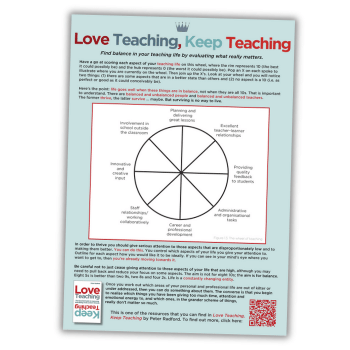Ofsted inspections – “Being a teacher can feel like being a criminal”

Given the humiliation involved in Ofsted’s oversight, it’s hardly surprising that teachers are seeking jobs elsewhere, says Carl Smith…

- by Carl Smith

Have any readers had a positive and affirming experience with Ofsted inspections lately?
* Bells toll, owls hoot, tumbleweed bobs along on the breeze *
Nope. Me neither. Not that Amanda Spielman will have had many herself recently, I suspect. Though I could be wrong.
The problem with sudden, seemingly arbitrary and yet career-threatening Ofsted inspections is that they’re, well, arbitrary and career-threatening. The terms ‘positive’ and ‘affirming’ don’t usually enter into it.
Typically, the only positivity you can expect from Ofsted inspections is the relief once it’s over. That’s providing you’ve not been rated Requires Improvement or Inadequate, of course. In which case you’re required to keep the news to yourself until the ‘big reveal’ six weeks later.
At that point you’re then expected to send a report laying out your inadequacies directly to potentially thousands of inboxes. This is a naming and shaming exercise reminiscent of the medieval stocks.
After the metaphorical vegetables have been thrown and the turnip juice on your face has dried, you’re free to run the inspection gauntlet again. Unless you’d rather pursue a career that doesn’t involve ritual public humiliation. I’ve heard there are quite a few of those.
Viral insecurity
Admittedly, teaching isn’t the only job subject to this kind of naming and shaming ritual. Footballers tend to get a fair few figurative turnips thrown in their direction, as do politicians and pop stars.
There’s a rather pernicious idea at play here. Because the potential rewards of such high profile careers are great, those affluent individuals who succeed in them are fair game for a spot of turnip-throwing. I can’t say I agree.
Yet this public retribution is even harder to justify when the targets are rather more modestly remunerated secondary school teachers. Needless to say, I’m not a fan.
We have a ‘culture of fear’ in schools (Spielman’s words, not mine) because insecurity is a virus – one that’s recently taken the form of a national epidemic. The vaccine in this analogy is trust, but alas, its nationwide roll-out has barely begun. Instead, we’re simply advised to take our chances and hope we end up somewhere with a low infection rate. A posh school, for instance.
Trending
Relentless pain
Ofsted is founded on the myth that fear drives improvement. That may be true up to a point, but relentless fear serves barely any purpose at all. Fear is similar to pain in that we may not like it, but can appreciate that it serves a purpose in alerting us to danger.
When pain becomes relentless, however, there’s no other purpose it can serve, and we’ll do anything to avoid it. Like getting another job.
Which is precisely what teachers are doing. Indeed, that’s what Amanda Spielman herself is doing. She announced her intention to step down as Ofsted’s HMCI before the end of the year.
Presently, being a teacher can feel like being a criminal. When inspectors call, it’s via dawn raids where they descend on schools, intent on finding incriminating evidence.
Ofsted inspections wreaking havoc
Oddly, though, it seems that incriminating evidence is more readily found at schools in the north of England. In a seeming re-enactment of the ‘Harrying of the North’ (ask a history teacher) inspectors appear to have wreaked more havoc in that part of the country than any other.
Another favourite target for Ofsted’s opprobrium are schools in disadvantaged areas. The places kids go to when they have the temerity to have parents who aren’t well off or well educated. These schools are knee-deep in turnip juice, so unsurprisingly, many teachers would prefer not to swim there.
Call me a medieval moderniser if you will, but I believe the age of throwing turnips ought to be behind us by now. How about growing them instead?
Carl Smith (@SmithCarl19530) is a school leader, having worked in secondary schools for over 30 years, a frequent contributor to educational books and periodicals and a public speaker










